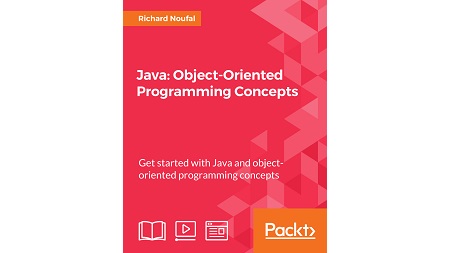
English | MP4 | AVC 1920×1080 | AAC 48KHz 2ch | 3h 10m | 530 MB
Get started with Java and object-oriented programming concepts
Java is a mature, elegant and sophisticated object oriented language that runs in a JVM (Java Virtual Machine).Once compiled into bytecode, Java can run in a JVM regardless of the underlying environment, Java is “Write once and run anywhere”. Over the years Java has built for itself the reputation of a language that is capable of delivering high performance robust applications that are elegant,structured and sophisticated. Java is about the Object Oriented way.
There are several aspects of the Java language that must be mastered for a developer to use Java at its full potential: The distinction between Classes and Objects, the interaction of Objects and Classes in the forging of an application, the concepts of OO programming (Inheritance and Polymorphism, Abstract Classes and Interfaces, Abstraction and Encapsulation), the memory model, Object identity, the Java Collections framework.
You will learn about all these fundamental aspects in this course.
Key Features
- Get an in-depth understanding of data structures and the Java Collections framework
- Create your own data structures
- Reinforcement of learning through projects and practical explanation about OOP concepts
What You Will Learn
- Discover the building blocks of Java program
- Explore the four pillars of Object-Oriented Programming
- Learn the intricacies of Inheritance and Polymorphism, Abstract Classes and Interfaces
- Discover the in memory representation and management of a Java program which is the foundation for understanding and analyzing the performance of a Java program
- Understand the implementation and use of the functions: hashCode() and equals()
- Master the fundamentals aspects of the Java Collection Framework
Table of Contents
Objects and Classes
1 The Course Overview
2 What is an object
3 What is a class
4 How do objects interact
5 Everything is an object
The Pillars of Object-Oriented Programming
6 Encapsulation
7 Abstraction
8 Inheritance
9 Polymorphism
10 Identity
The Java Memory Model
11 Everything is a reference
12 The heap and the stack
13 Garbage collection
Object Identity in Java
14 Identity vs Equality
15 Value objects
16 Implementing hashCode() and equals()
Java’s Approach to Object-Oriented Programming
17 Associations, aggregation and composition
18 Inheritance and polymorphism
19 Interfaces and abstract classes
20 A few words on mixins and traits
Data Structures – The Java Collections Framework
21 Collections, Lists, Sets, Queues, Heaps, Stacks, and More
22 Iterators
23 Maps
Resolve the captcha to access the links!